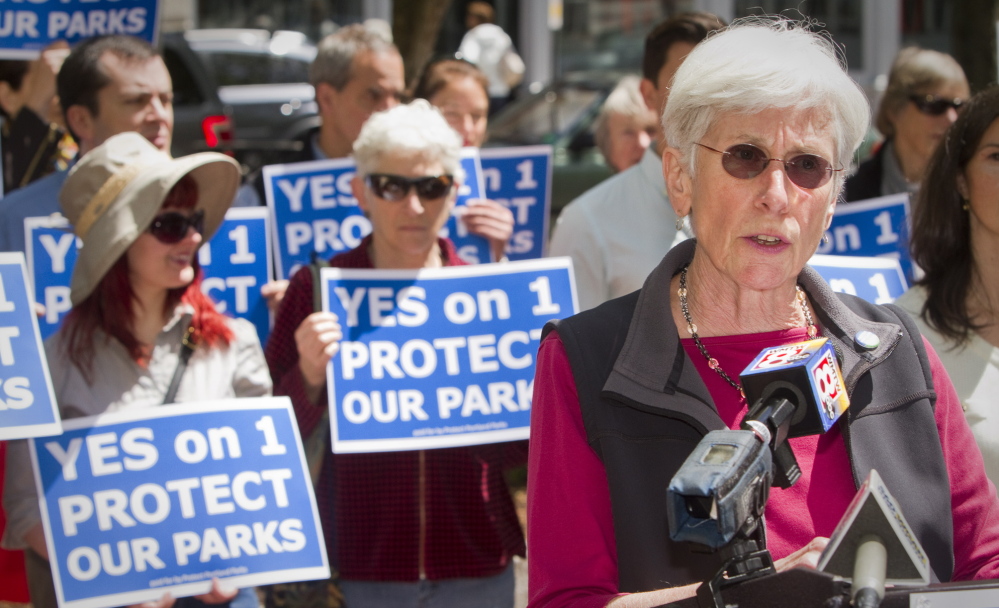Members of the group Protect Portland Parks said Thursday that a proposal on the city’s June 10 ballot would strengthen the public’s voice in decisions on the fate of public spaces as development pressure increases in Portland.
But opponents accused the proposal’s backers of floating a “red herring” in park-friendly Portland in an attempt to reverse a controversial decision by the City Council to sell part of Congress Square Plaza.
The site where Protect Portland Parks held Thursday’s event – Post Office Park in the Old Port – is among 35 city-owned properties the ballot proposal would add to the list of 25 parcels already overseen by the Land Bank Commission. Created in 1999, the commission identifies city-owned open space and protects it from development.
Former Portland Mayor and City Councilor Anne Pringle said Post Office Park exists only because residents fought against a City Council decision in 1992 to turn the site into parking spaces. She said the popular park at Middle and Exchange streets has few protections today, if city officials decide it is more valuable as real estate than as public space.
The ballot question would require the city to receive an endorsement from the Land Bank Commission and affirmative votes from eight of the nine city councilors before selling any of the 60 public spaces. If only six or seven councilors approved a sale, the issue would be decided by Portland voters.
“Whose decision should it be to sell a park, however rare an occasion that may be: the City Council or the public?” Pringle said. “That’s the fundamental question. And my answer to that question is, the public should decide.”
One parcel that would gain the stronger protections proposed in the referendum is Congress Square Plaza, an underutilized plaza that has become a lightning rod in the larger debate over park space in Portland.
The City Council voted last fall to sell two-thirds of the plaza to the developer of the adjacent Westin Portland Harborview Hotel, which wants to build a multi-use event center on the site. The rest of the plaza would be renovated and remain open to the public.
The organization Friends of Congress Square Park denounced the City Council’s no-bid decision to sell the space to the developer for $523,640, which critics say is far less than the site’s value.
The friends group gathered 4,000 signatures to force the June 10 vote. But rather than asking voters solely about the sale of the plaza, the ballot initiative was broadened to change the way the city would have to handle proposed sales of the 35 other public spaces.
Former Mayor and Councilor Jim Cohen, chairman of the Forward Portland group, which opposes the initiative, said the premise that Portland’s parks are under threat is wrong. The city has added public space in recent years, and most of the parks in Protect Portland Parks’ promotional materials – including Deering Oaks and the Eastern and Western Promenade parks – are already protected by deed or through legislation.
“This is a false narrative being portrayed by supporters in part to hide the real issue, which is Congress Square,” Cohen said.
The City Council voted in April to expand the list of public spaces overseen by the Land Bank Commission. But unlike the ballot proposal, the City Council ordinance excludes Congress Square Plaza and lacks a provision to require voter approval of proposed sales that fail to get the support of at least eight councilors.
Send questions/comments to the editors.



